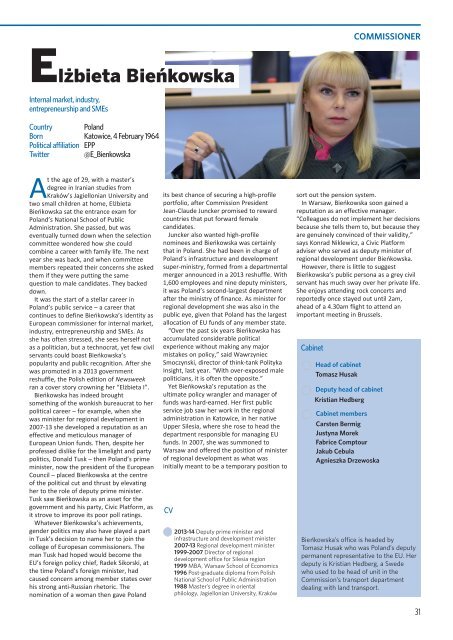Commission-companion-full
Commission-companion-full
Commission-companion-full
Create successful ePaper yourself
Turn your PDF publications into a flip-book with our unique Google optimized e-Paper software.
COMMISSIONER<br />
Elżbieta Bieńkowska<br />
Internal market, industry,<br />
entrepreneurship and SMEs<br />
Country Poland<br />
Born Katowice, 4 February 1964<br />
Political affiliation EPP<br />
Twitter<br />
@E_Bienkowska<br />
At the age of 29, with a master’s<br />
degree in Iranian studies from<br />
Kraków’s Jagiellonian University and<br />
two small children at home, Elżbieta<br />
Bieńkowska sat the entrance exam for<br />
Poland’s National School of Public<br />
Administration. She passed, but was<br />
eventually turned down when the selection<br />
committee wondered how she could<br />
combine a career with family life. The next<br />
year she was back, and when committee<br />
members repeated their concerns she asked<br />
them if they were putting the same<br />
question to male candidates. They backed<br />
down.<br />
It was the start of a stellar career in<br />
Poland’s public service – a career that<br />
continues to define Bieńkowska’s identity as<br />
European commissioner for internal market,<br />
industry, entrepreneurship and SMEs. As<br />
she has often stressed, she sees herself not<br />
as a politician, but a technocrat, yet few civil<br />
servants could boast Bieńkowska’s<br />
popularity and public recognition. After she<br />
was promoted in a 2013 government<br />
reshuffle, the Polish edition of Newsweek<br />
ran a cover story crowning her “Elżbieta I”.<br />
Bieńkowska has indeed brought<br />
something of the wonkish bureaucrat to her<br />
political career – for example, when she<br />
was minister for regional development in<br />
200713 she developed a reputation as an<br />
effective and meticulous manager of<br />
European Union funds. Then, despite her<br />
professed dislike for the limelight and party<br />
politics, Donald Tusk – then Poland’s prime<br />
minister, now the president of the European<br />
Council – placed Bieńkowska at the centre<br />
of the political cut and thrust by elevating<br />
her to the role of deputy prime minister.<br />
Tusk saw Bieńkowska as an asset for the<br />
government and his party, Civic Platform, as<br />
it strove to improve its poor poll ratings.<br />
Whatever Bieńkowska’s achievements,<br />
gender politics may also have played a part<br />
in Tusk’s decision to name her to join the<br />
college of Europesan commissioners. The<br />
man Tusk had hoped would become the<br />
EU’s foreign policy chief, Radek Sikorski, at<br />
the time Poland’s foreign minister, had<br />
caused concern among member states over<br />
his strong antiRussian rhetoric. The<br />
nomination of a woman then gave Poland<br />
its best chance of securing a highprofile<br />
portfolio, after <strong>Commission</strong> President<br />
JeanClaude Juncker promised to reward<br />
countries that put forward female<br />
candidates.<br />
Juncker also wanted highprofile<br />
nominees and Bieńkowska was certainly<br />
that in Poland. She had been in charge of<br />
Poland’s infrastructure and development<br />
superministry, formed from a departmental<br />
merger announced in a 2013 reshuffle. With<br />
1,600 employees and nine deputy ministers,<br />
it was Poland’s secondlargest department<br />
after the ministry of finance. As minister for<br />
regional development she was also in the<br />
public eye, given that Poland has the largest<br />
allocation of EU funds of any member state.<br />
“Over the past six years Bieńkowska has<br />
accumulated considerable political<br />
experience without making any major<br />
mistakes on policy,” said Wawrzyniec<br />
Smoczynski, director of thinktank Polityka<br />
Insight, last year. “With overexposed male<br />
politicians, it is often the opposite.”<br />
Yet Bieńkowska’s reputation as the<br />
ultimate policy wrangler and manager of<br />
funds was hardearned. Her first public<br />
service job saw her work in the regional<br />
administration in Katowice, in her native<br />
Upper Silesia, where she rose to head the<br />
department responsible for managing EU<br />
funds. In 2007, she was summoned to<br />
Warsaw and offered the position of minister<br />
of regional development as what was<br />
initially meant to be a temporary position to<br />
CV<br />
2013-14 Deputy prime minister and<br />
infrastructure and development minister<br />
2007-13 Regional development minister<br />
1999-2007 Director of regional<br />
development office for Silesia region<br />
1999 MBA, Warsaw School of Economics<br />
1996 Post-graduate diploma from Polish<br />
National School of Public Administration<br />
1988 Master’s degree in oriental<br />
philology, Jagiellonian University, Kraków<br />
sort out the pension system.<br />
In Warsaw, Bieńkowska soon gained a<br />
reputation as an effective manager.<br />
“Colleagues do not implement her decisions<br />
because she tells them to, but because they<br />
are genuinely convinced of their validity,”<br />
says Konrad Niklewicz, a Civic Platform<br />
adviser who served as deputy minister of<br />
regional development under Bieńkowska.<br />
However, there is little to suggest<br />
Bieńkowska’s public persona as a grey civil<br />
servant has much sway over her private life.<br />
She enjoys attending rock concerts and<br />
reportedly once stayed out until 2am,<br />
ahead of a 4.30am flight to attend an<br />
important meeting in Brussels.<br />
Cabinet<br />
Head of cabinet<br />
Tomasz Husak<br />
Deputy head of cabinet<br />
Kristian Hedberg<br />
Cabinet members<br />
Carsten Bermig<br />
Justyna Morek<br />
Fabrice Comptour<br />
Jakub Cebula<br />
Agnieszka Drzewoska<br />
Bien‘kowska’s office is headed by<br />
Tomasz Husak who was Poland’s deputy<br />
permanent representative to the EU. Her<br />
deputy is Kristian Hedberg, a Swede<br />
who used to be head of unit in the<br />
<strong>Commission</strong>’s transport department<br />
dealing with land transport.<br />
31


